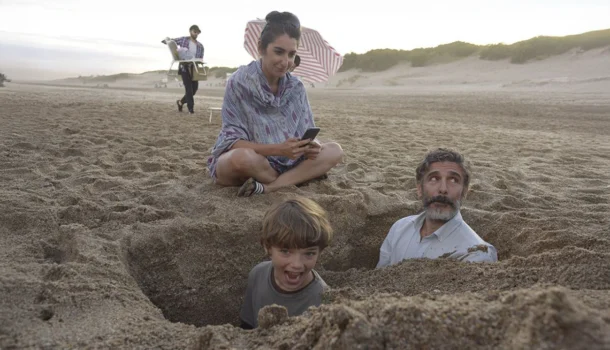It is in the unexpected rearrangements of daily life that the most intimate bonds are truly tested. Marriages, initially ignited by the vertigo of desire, tend to solidify into quieter pacts, where the shared routine must make room for the small sacrifices that the arrival of children inevitably demands. At first, these concessions seem temporary; over time, however, they transform into invisible layers of fatigue, tension, and inevitable distance. The couple that once thrived on their own combustion now finds themselves orbiting around a third body — and when that body grows, it claims its place in the world with a kind of urgency that even the most present parents are never fully prepared to accommodate. What follows is an emotional disorder that defies logic: a chaos that demands, for its resolution, not only patience but a kind of enchantment.
It is precisely this dislocation that strikes Gabriel Gaitán — or Gallo, as he is better known — a television producer chronically absorbed in his work. What forces him to look beyond scripts and deadlines is not a career crisis, but an explosive revelation: the possibility that he is the father of Benito, a boy previously absent from every chapter of his life. At first glance, it appears to be just another misstep of fate. But as the day-to-day interaction takes root, the story reveals a more intricate design: the collision of two worlds misaligned by time and absence, yet tied together by a mutual longing. Salvador Espinosa, attuned to the fluctuating nature of this relationship, shapes the film as a tonal hybrid — balancing moments of near-farcical comedy with scenes that brush against drama with surprising tenderness.
The absence of a traditional timeline — the conventional arc from diapers to diplomas — makes Gallo’s journey especially unsettling. He doesn’t go through a gradual build-up of responsibilities, but rather a sudden collapse of certainties. He never faced potty training dilemmas, report card anxieties, teenage storms, or the questioning of a child’s future career path. Everything arrives at once, condensed in Benito’s face, already mature enough to suspect his story rests on missing pieces. From there, father and son embark on a journey both physical and emotional, tracing the footsteps of Alicia Uliarte — the boy’s now-deceased mother — in search of clues that might confirm or deny the paternity.
This act of retracing the past operates on two levels: not only as a possible reconstruction of genetic lineage, but also as a reweaving of the emotional trajectory between two individuals who barely know what to expect from each other. Tato Alexander, the screenwriter, structures this search as a spiral of small revelations, where each uncovered detail demands a reinterpretation of the growing bond between them. There is no rush to resolve the central question — whether Benito is Gallo’s biological son — because what’s truly at stake is something more delicate: the creation of a sense of belonging that doesn’t depend on DNA to be real.
The chemistry between Michel Brown and Daniel Abrego thus becomes the film’s core pillar. The contrast between an adult burdened by years of work-first living and a vulnerable boy seeking clarity about his origins injects the narrative with dynamic momentum. And, in a rare show of restraint, the production understands its own boundaries: it ends at precisely the right moment, without unnecessary prolongations or tidy resolutions. What lingers is the feeling that something essential has been touched — not through clear answers, but through a shared recognition that loving someone might be the most legitimate way to begin understanding the past.
Film: The Dad Quest
Director: Salvador Espinosa
Year: 2025
Genres: Drama/Comedy
Rating: 8/10

